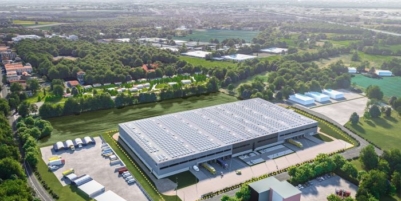-
Rite-Hite unveils new range of hydraulic kits to upgrade and extend dock leveller performance - 2 days ago
-
REWE and Cimcorp automate fresh supply chain for Berlin supermarkets and stores - 2 days ago
-
Q1 – A recovery period or time to fix, switch and scale? - February 19, 2026
-
NULOGY’S SHOP FLOOR SOFTWARE TO POWER COMPLETE CO-PACKING’SOPERATIONS - February 13, 2026
-
Why lead generation depends upon good content - February 13, 2026
-
Wallapop and Albatross Sign Strategic Partnership to Bring Real-Time AI Discovery to the Future of Consumer-to-Consumer Commerce - February 12, 2026
-
Thorworld ramp helps Hubergroup to streamline its unloading operation - February 6, 2026
-
TRACKER INNOVATION FROM QUECLINK TO BOOST STOLEN VEHICLE RECOVERY PERFORMANCE - February 4, 2026
-
Flexi Narrow Aisle hits 50! - January 29, 2026
-
DERRY BROS ATTRACTS RECORD NUMBERS OF FREIGHT CUSTOMERS SEEKING CUSTOMS SUPPORT - January 29, 2026
OpenADR becoming the most common standard for EV charging demand response applications
AMPECO and OpenADR Alliance have announced their partnership at Enlit Europe 2022 in Frankfurt, to empower global utilities and charge point operators in unlocking energy flexibility opportunities. Coinciding with Europe’s largest event for distributed energy resources with more than 15,000 attendees, today’s announcement demonstrates the growing momentum for cloud-based demand response (DR) solutions in the context of electric vehicle (EV) charging.
Through this partnership with OpenADR Alliance and the availability of AMPECO’s OpenADR 2.0b certified EV charging platform, charge point operators can now readily integrate their charging networks. They can also participate in cloud-based demand response events to generate extra revenue and explore new applications for dynamic pricing, renewable energy integrations, and ancillary services.
“AMPECO’s EV charging management platform is compliant with OpenADR, certifying that our software can communicate with utilities managing energy loads on the electrical grid. This allows our global clients to cover new use cases by participating in demand response events, generate extra revenue, and offer new services,” said Orlin Radev, CEO, AMPECO.
Utilities can leverage OpenADR to evolve their business models around EV charging demand response applications and embrace the new distributed energy paradigm. The OpenADR standard is ideally suited to send price signals making it easy for utilities to charge more in times of power constraint, allowing customers to delay charging when the grid is under stress.
Apart from the rapid delivery of price and event information through a secure network, OpenADR provides several benefits for utilities and energy providers: increased grid reliability, attainment of DR goals, mitigated impact of critical peak pricing (CPP) events, and enhanced customer value.
“Today we are taking another major step in expanding OpenADR certified products to the global market, and ensuring that they are tested for quality, security and interoperability,” said Rolf Bienert, Executive and Technical Director, OpenADR Alliance. “We look forward to collaborating with AMPECO on opportunities for the OpenADR standard to help manage distributed energy resources throughout Europe.”
The OpenADR certification of AMPECO’s EV charging platform enables charge point operators to participate in demand response events, opening up new business opportunities and allowing for greater value stacking. Recognized by the IEC (International Electrotechnical Commission) as an international standard, OpenADR is becoming the most common standard used by utility and wholesale market DR programs and has already been leveraged in EV charging by utilities in partnership with automotive OEMs. The standard continues to grow globally, with an uptick in deployments in Germany, the UK, and across Western Europe.
New technologies and standards will empower consumers to exploit EV flexibility. Customers will benefit from more vendor products and opportunities to participate in multiple DR programs that will reward them for responding to power fluctuations

































